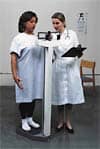A new study published in the Journal of Clinical Sleep Medicine highlights the effectiveness of Wesper, a portable sleep lab designed to diagnose and titrate sleep apnea and other sleep-related disorders.
The study demonstrates that Wesper compares favorably with polysomnography (PSG), the gold standard, paving the way for improved diagnosis and management of sleep apnea. Wesper aims to revolutionize the sleep management process by enhancing diagnostic accuracy and enabling long-term monitoring by implementing clinical-grade measures, according to a release from the company.
“The publication of this study in the Journal of Clinical Sleep Medicine is a significant milestone in sleep medicine. The findings showcase the effectiveness of Wesper for diagnosing and managing sleep apnea and related sleep disorders. This innovative sleep testing platform represents a major leap forward in revolutionizing sleep care. It offers hope for improved detection and management of sleep conditions and their associated complications,” says Sonia Ancoli-Israel, PhD, professor emeritus, department of psychiatry, University of California, in a release.
The study enrolled patients who underwent simultaneous PSG and Wesper testing. Respiratory effort, airflow, air pressure, and body position were measured using patented and specialized wearable patches. The accuracy of Wesper was assessed by comparing the apnea-hypopnea indices as determined by both testing methods.
The study illustrated accuracy. The correlation between PSG and Wesper’s apnea-hypopnea index determinations was 0.951, meeting the primary endpoint goal with high confidence (p = 0.0003). The device outputs were leveraged to differentiate between positional and central apnea events, which are important clinical decision support tools. No adverse events or serious adverse events were observed during the study.
“This important study underscores the major potential of Wesper in diagnosing and managing sleep disorders. With increasing data on the value of longitudinal assessments of sleep apnea, this new technology may facilitate improved patient care and outcomes in the realm of sleep disorders,” says Atul Malhotra, MD, University of California San Diego, division of pulmonary, critical care, sleep medicine, and physiology, in a release.
Wesper is set to be showcased at the upcoming American Physician Group conference and the American Academy of Sleep Medicine conference.
Photo caption: Wesper patches
Photo credit: Wesper




